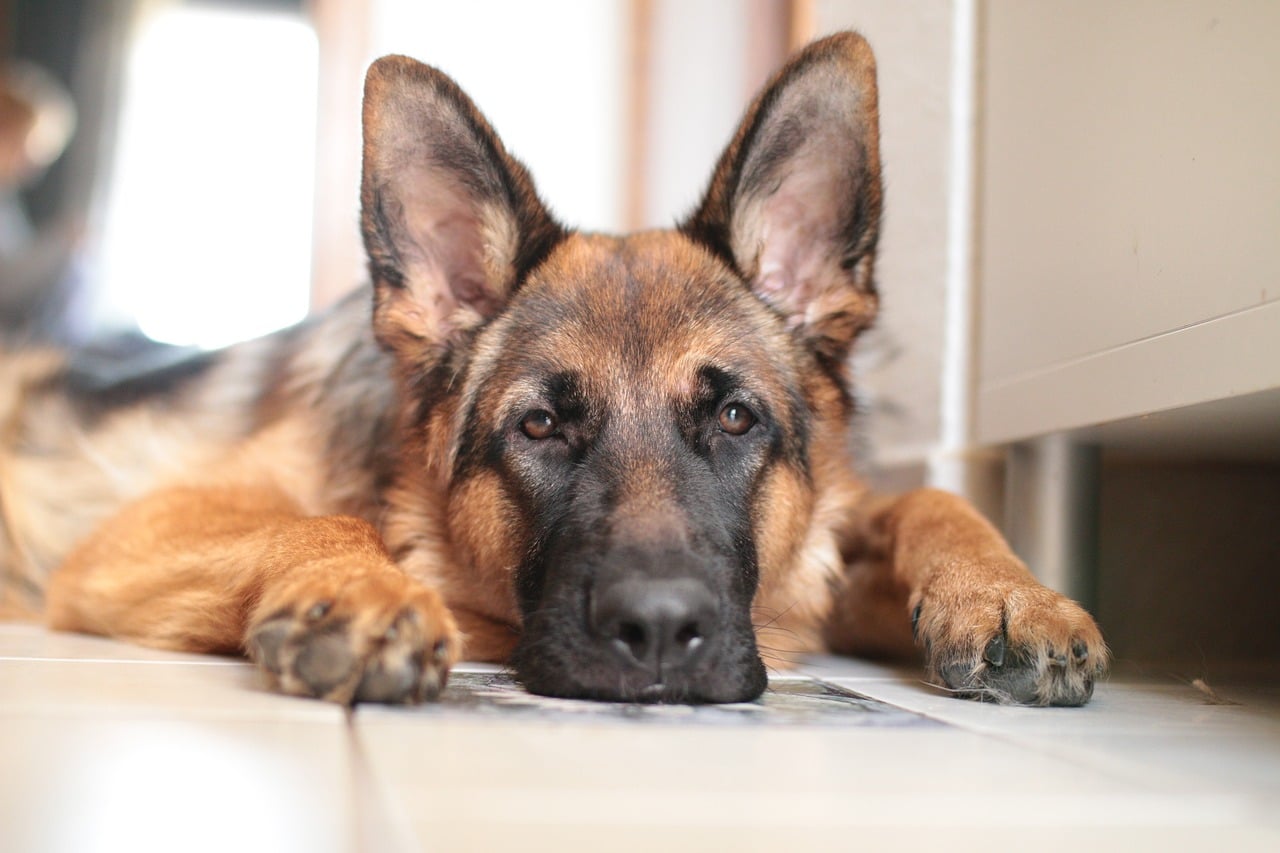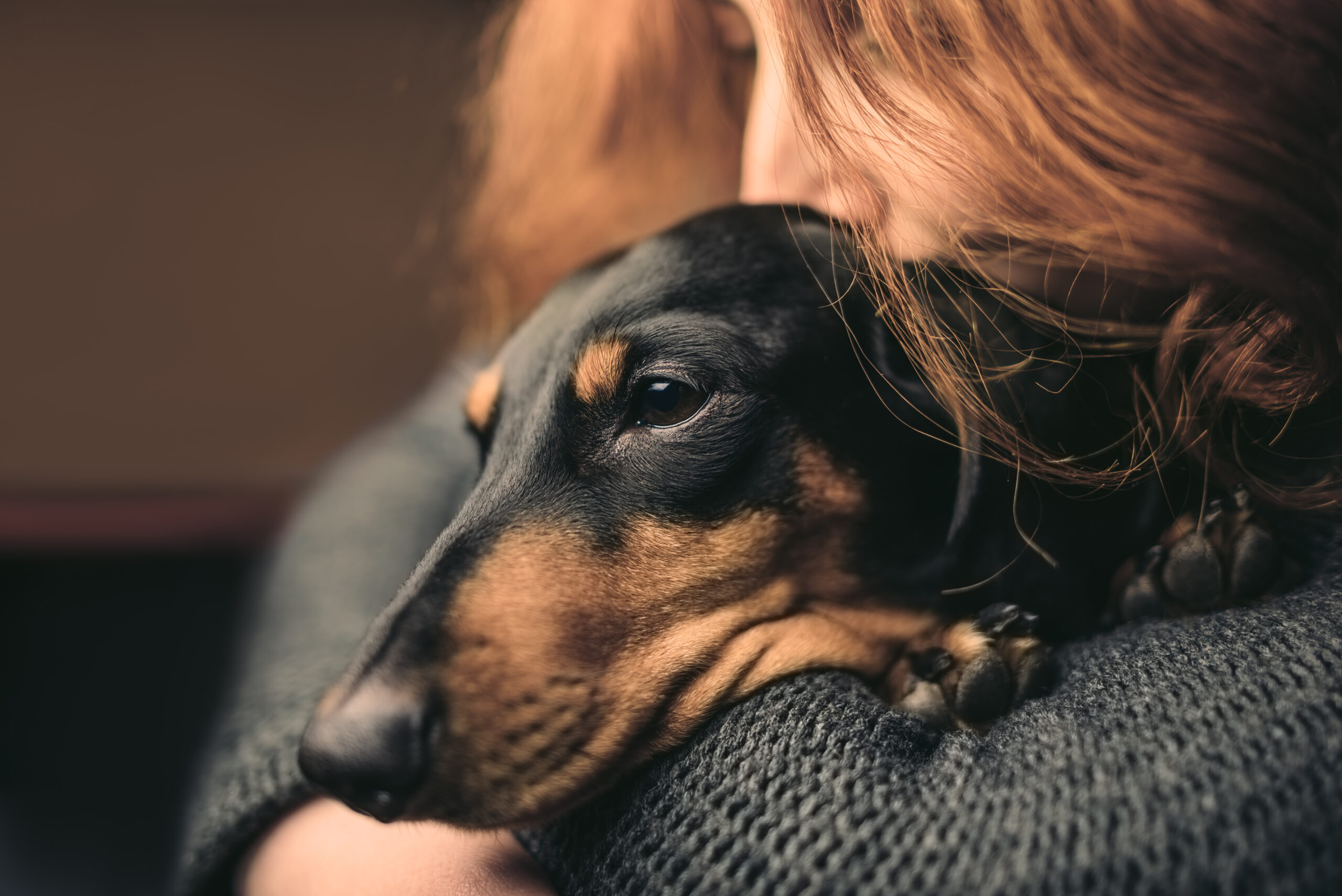Unfortunately, it’s a common story. Your dog isn’t acting right. Something is off. And then it strikes. Diarrhea. This unpleasant affliction is common. An upset stomach is one of the most common reasons pups visit the doctor. Oftentimes, the gastrointestinal or stomach issue is colitis.
People with dogs need to understand the differences between an upset tummy and colitis. For some dogs, the disease will evolve into chronic diarrhea. No fun. This is how to recognize the disease and what to do about it.
What Is Colitis?
You don’t need a degree in biology to understand this illness. The definition is simple. Colitis is the inflammation of the large intestine (colon). Colitis is often used to describe diarrhea or loose stools. Remember: colitis and diarrhea are not synonymous. However, large bowel diarrhea is also used interchangeably with colitis.
Sometimes, an upset stomach is just an upset stomach. If your dog has loose stool once or twice, it doesn’t mean she has the disease.
What Are The Symptoms?
Frequent, small volumes of semi-formed to liquid feces are indicators. In many cases, the loose stool becomes more common than normal feces.
Your dog may strain when defecating. Gas and constipation are other common symptoms. Also, you may notice small amounts of blood or mucus in your pup’s stool. Dogs also exhibit an increased urge to defecate. This is what you won’t see if your dog gets this disease: vomiting or weight loss.

What Is The Cause?
Many different factors can lead to this disease, but the most common causes include:
- Whipworms. These worms live in the intestine and reproduce rapidly, causing digestive problems that could lead to diarrhea.
- Other parasites. Giardia and Crystosporidium, can also cause colitis.
- Irritable bowel syndrome
- Chronic inflammatory bowel disease
- Trauma
- Infections from Salmonella, Clostridium, and E. coli
- Pancreatitis
- Stress
- Allergies
- Tainted food
- Exposure to a damp environment
No matter the impetus, the disease is dangerous. An inflamed colon leads to reduced water absorption and the decreased ability to store feces in the colon. Which results in, you guessed it, diarrhea.
Is My Dog At Risk?
There are risk factors that increase your dog’s risk for acute or chronic colitis. Age, breed, environment, and immune status can lead to an acute version of the disease. For example, puppies are susceptible to a variety of bacteria, viruses, and parasites that can cause an acute episode of colitis.
If your dog is undergoing cancer treatment, immune system suppression can aid the growth of bad bacteria in the colon, causing your pup to have loose stool.
Which Breeds Are Most At-Risk For Colitis?
Chronic colitis is not tied to a specific age or gender. However, some breeds are predisposed to inflammatory bowel disease (IBD). This disease often leads to chronic colitis. These are the breeds at risk:
- Boxers
- German Shepherds
- French Bulldogs
- Miniature Schnauzers

What Is The Diagnosis Process?
As you are now aware, there are many causes of this disease. When you visit the vet, the doctor will ask you a host of questions about your dog’s medical history. They will want to know about recent travel, interaction with other dogs, symptoms, what your dog eats, and more.
Once the vet gets more information from you, testing and exams are necessary. The doctor evaluates your pup’s feces, gives a rectal examination, cytology, and conducts blood tests.
Get the Scoop on Doggy Diarrhea
According to VCA Animal Hospitals, “Additional testing such as radiographs to examine the colon and intestinal tract, colonoscopy and colon biopsies, fecal cultures, barium enemas, or ultrasound evaluation of the abdomen may be necessary in some cases. These tests are important to rule out conditions such as colonic tumors or polyps, irritable bowel syndrome, cecal inversion, and ileocecocolic intussusception (a rare condition in which the intestines ‘telescope’ or fold into themselves).”
What Is The Treatment Protocol?
Treating colitis in dogs involves a combination of dietary changes, medication, and sometimes lifestyle adjustments. Initially, your veterinarian may recommend fasting your dog for 24 to 48 hours to give the digestive system a break and reduce inflammation. After the fasting period, a low-residue or hypoallergenic diet, often with increased dietary fiber and added fermentable fiber, can help manage symptoms and promote digestive health.
Depending on the underlying cause of colitis, your vet may prescribe specific medications. For example, antimicrobial medications might be necessary if an infection is present, while anti-inflammatory drugs or immune-suppressing medications are used for inflammatory or immune-mediated colitis. If parasites like worms are the cause, deworming tablets will be prescribed.
In addition to these treatments, probiotics can be beneficial, as they help restore a healthy balance of gut bacteria, aiding in the control of bowel issues. While colitis often resolves on its own, following your veterinarian’s guidance on dietary and medicinal interventions can significantly improve your dog’s recovery and overall well-being.

What Else Should I Know About Colitis?
Thankfully, there are ways to prevent your pup from acquiring this illness:
- Watch what your dog eats (keep her out of the trash!)
- Provide fresh water daily
- Get rid of any parasites in her body by giving her monthly preventives
- Give fecal samples to her veterinarian during her annual examine
- Make sure your dog is current on all recommended vaccines.
- Avoid interaction with other sick dogs in public places like the park and doggy daycare
- Pick a nutrient profile with high-quality, high-digestibility protein. Protein for adult dogs should be between 15% and 30% on a dry matter (DM) basis.
Don’t beat yourself up if your pup eats food from the trash or finds some unsavory snack on his walk. After all, dogs have free will and you are not all-seeing. Be on the lookout for changes in your dog’s bowel movements. When behavior becomes abnormal, it’s time to seek medical assistance. Remember, this disease is highly treatable. Changes to your pup’s diet and medication will get their bowel movements back to normal.
Frequently Asked Questions
Humans are not alone in digestive issues for dogs; one of the most common forms is colitis or inflammation of the colon in a dog. A dog’s appetite and speed of recovery from colitis can be improved with the right diet. However, there are some things you need to know to help your dog during these tummy trouble times. Learn all the facts you need here to help your dog with colitis.
What Should You Avoid Feeding Dogs With Colitis?
You should stay away from foods heavy in fat if your dog has colitis. Also, avoid high salt and rich foods. Instead, opt for bland foods such as chicken and rice. Kibble may be out of the question for your dog, as well as canned wet food. Avoid all treats and any food prepared for humans, as these can worsen the complications of colitis and irritate the digestive tract.
What Is Stress Colitis In Dogs?
Inflammation of the colon or large intestine due to stress, either psychologically or physiologically, is known as stress colitis. In the same way that stress may have negative effects on human health, it can do the same to your dog. This can leave patients more vulnerable to bacterial illnesses like colitis. Additionally, this inflammation might be either short-term or long-term. Diarrhea, vomiting, and frequent feces are all symptoms of canine colitis, whether it is acute or chronic.
The physical discomfort associated with major surgeries, injuries, intense exercise, and other environmental variables are common causes of stress in pets. Relocation, the addition of a new family member (such as a child or pet), and exposure to novel situations can all contribute to emotional strain.
Can Colitis In Dogs Be Treated Naturally?
A bland diet at home offers the best natural diet. Instead of buying kibble and canned dog food, make simple foods at home. For example, you can boil some sweet potatoes, rice, and chicken. However, check with your dog’s veterinarian to learn what supplements your dog may need.
Next, add some pumpkin for fiber and probiotics to aid the good bacteria in your dog’s gut. Prebiotics are essential nourishment for the good bacteria already present in the intestines. They support a balanced flora in the canine colon, which in turn aids in the treatment of diarrhea.
If your dog’s chronic colitis has not responded to other treatments, your veterinarian may recommend glucocorticoids for their ability to reduce inflammation and control diarrhea. Always check with the vet before making decisions about your dog’s diet, especially when they have health concerns involved.

Is Colitis In Dogs Contagious?
No, colitis is neither an infection nor a virus. It’s inflammation that is not contagious. With that said, some of the factors that contribute to the development of colitis in dogs, such as worms, are contagious to other canines. In that situation, the parasite that causes colitis is an infectious disease.
Do not be concerned, however, as people cannot contract colitis from dogs.
How Long Does Colitis Last In Dogs?
For the majority of dogs, all that is required for treatment is a straightforward adjustment to their food, along with some medicine to clear up any inflammation or infection in their colon. The vast majority of canines that have been diagnosed with stress colitis will return to normal within three to five days.
What Triggers Colitis In Dogs?
An attack of colitis may be brought on by experiences that are particularly stressful, such as boarding an airplane, traveling, or moving. Consuming something that causes discomfort in the digestive tract is another potential cause. If diarrhea lasts more than 24 hours, you should get it checked out by a veterinarian because there are many things that could have caused colitis.
Does Colitis In Dogs Go Away?
Within 24 to 48 hours, acute colitis usually improves without treatment. However, there is no single reason for chronic colitis. Some can be cured by treatment, while others can only be controlled with diet and medication.


